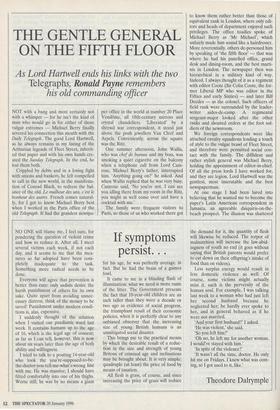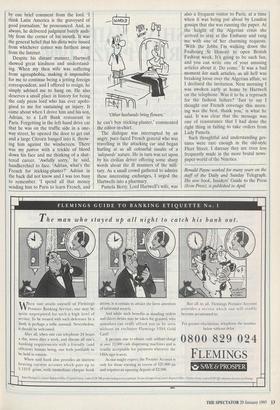THE GENTLE GENERAL ON THE FIFTH FLOOR
As Lord Hartwell ends his links with the two Telegraphs, Ronald Payne remembers his old commanding officer NOT with a bang and most certainly not with a whimper — for he isn't the kind of man who would go in for either of those vulgar extremes — Michael Berry finally severed his connection this month with the Daily Telegraph. The good Lord Hartwell, as he always remains in my listing of the Arthurian legends of Fleet Street, inherit- ed that paper and with his own hands cre- ated the Sunday Telegraph. In the end, he lost them both.
Crippled by debts and in a losing fight with unions and bankers, he felt compelled to call in the new world, in the manifesta- tion of Conrad Black, to redress the bal- ance of the old. Le malheur des uns, c'est le bonheur des autres. French comes natural- ly, for I got to know Michael Berry best when I worked in the Paris office of the old Telegraph. It had the grandest newspa- per office in the world at number 20 Place Vendome, all 18th-century mirrors and crystal chandeliers. 'Liberated' by a shrewd war correspondent, it stood just above the posh jewellers Van Cleef and Arpels. Conveniently, across the square was the Ritz.
One summer afternoon, John Wallis, who was chef de bureau and my boss, was smoking a quiet cigarette on the balcony when a telephone call from Lord Cam- rose, Michael Berry's father, interrupted him. 'Anything going on?' he asked. And when Wallis replied that he was very busy, Camrose said, 'No you're not. I can see you idling there from my room in the Ritz, you might as well come over and have a cocktail with me.'
The family were frequent visitors to Paris, so those of us who worked there got to know them rather better than those of equivalent rank in London, where only edi- tors and heads of department enjoyed such privileges. The office toadies spoke of Michael Berry as `Mr Michael', which unfairly made him sound like a hairdresser. More reverentially, others de-personed him by speaking of 'the fifth floor' — that was where he had his panelled office, grand desk and dining-room, and the best marti- nis in London. The newspaper then was hierarchical in a military kind of way. Indeed, I always thought of it as a regiment with editor Coote (Sir Colin Coote, the for- mer Liberal MP who was editor in the Fifties and early Sixties) — and later Bill Deedes — as the colonel. Such officers of field rank were surrounded by the leader- writer aides-de-camp. A regimental sergeant-major looked after the other ranks and shouted orders at the foot sol- diers of the newsroom.
We foreign correspondents were like attached cavalry squadrons lending a touch of style to the vulgar brawl of Fleet Street, and therefore were permitted social con- tact with the family. The diffident and rather stylish general was Michael Berry, holding the appointment of editor-in-chief. Of all the press lords I have worked for, and they are legion, Lord Hartwell was the gentlest, most inscrutable and the best newspaperman.
At one stage I had been lured into believing that he wanted me to become the paper's Latin American correspondent in Jamaica, an agreeable daiquiris-on-the- beach prospect. The illusion was shattered by one brief comment from the lord. 'I think Latin America is the graveyard of good journalism,' he pronounced. And, as always, he delivered judgment barely audi- bly from the corner of his mouth. It was the general belief that his dicta were issued from whichever corner was furthest away from the listener.
Despite his distant manner, Hartwell showed great kindness and understand- ing. When my then wife was suffering from agoraphobia, making it impossible for me to continue being a jetting foreign correspondent, and I offered to resign, he simply advised me to hang on. He also deserves a small place in history for being the only press lord who has ever apolo- gised to me for sustaining an injury. It came about when I drove him and his son, Adrian, to a Left Bank restaurant in Paris. Forgetting in the left-hand drive car that he was on the traffic side in a one- way street, he opened the door to get out and a large Citroen banged into it, throw- ing him against the windscreen. There was my patron with a trickle of blood down his face and me thinking of a shat- tered career. 'Awfully sorry,' he said, handkerchief to face. 'Adrian, what's the French for sticking-plaster?' Adrian in the back did not know and I was too busy to remember. 'I spend all that money sending him to Paris to learn French, and `Other husbands bring flowers.'
he can't buy sticking-plaster,' commented the editor-in-chief.
The dialogue was interrupted by an angry, puce-faced French general who was travelling in the attacking car and began hurling at us all colourful insults of a `salopards' nature. He in turn was set upon by his civilian driver offering some sharp words about the ill manners of the mili- tary. As a small crowd gathered to admire these interesting exchanges, I urged the Hartwells into a pharmacy.
Pamela Berry, Lord Hartwell's wife, was also a frequent visitor to Paris, at a time when it was being put about by London gossips that she was running the paper. At the height of the Algerian crisis she arrived to stay at the Embassy and rang me with one of her charming requests. `With the Jebbs I'm walking down the Faubourg St Honore to open British Fashion week. It's going to be such fun, and you can write one of your amusing articles about it. Do come.' It was a bad moment for such articles, as all hell was breaking loose over the Algerian affair, so I declined the invitation. Next morning I was awoken early at home by Hartwell on the telephone. Was it to be a reproach for the fashion failure? 'Just to say I thought our French coverage this morn- ing was the best, thank you,' is what he said. It was clear that the message was one of reassurance that I had done the right thing in failing to take orders from Lady Pamela.
Such thoughtful and understanding ges- tures were rare enough in the old-style Fleet Street. I daresay they are even less frequently made in the more brutal news- paper world of the Nineties.
Ronald Payne worked for many years on the staff of the Daily and Sunday Telegraph. His new book, Insiders' Guide to the Press (Icon Press), is published in April.



























































 Previous page
Previous page